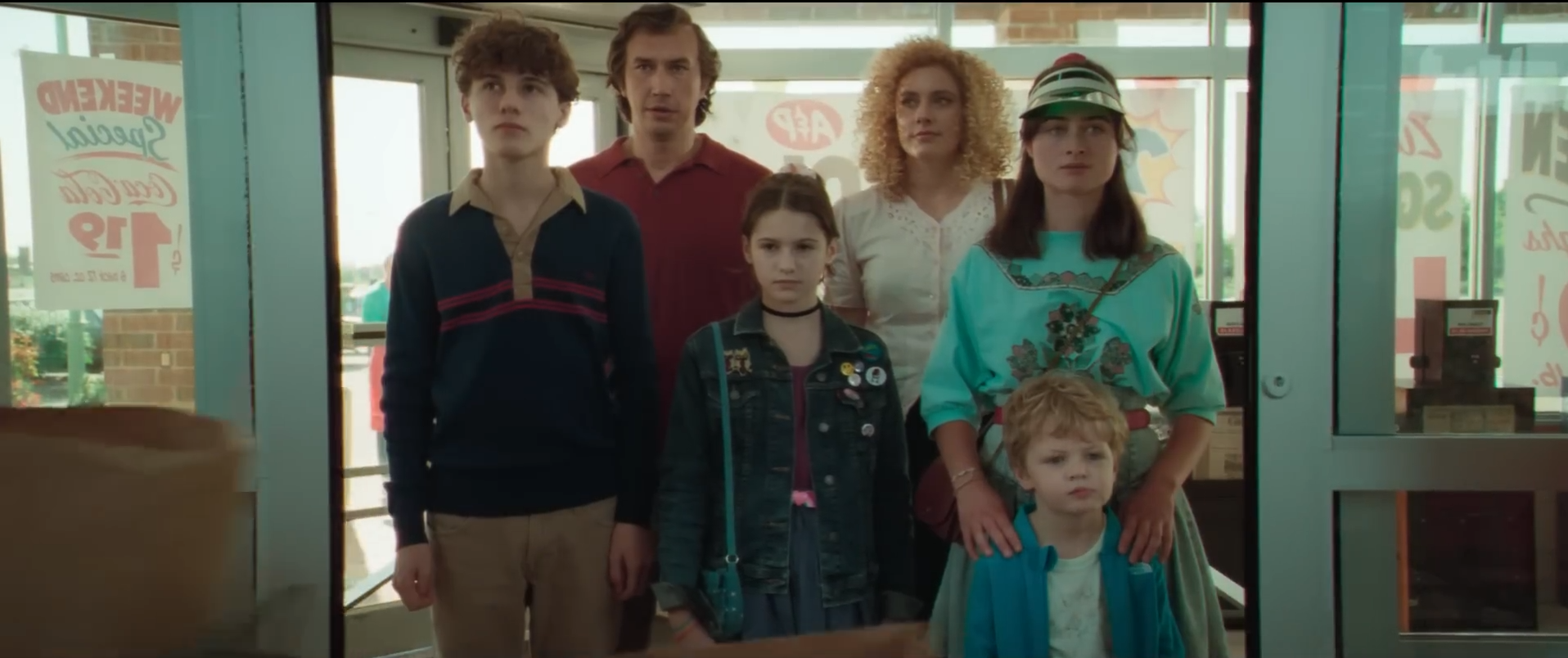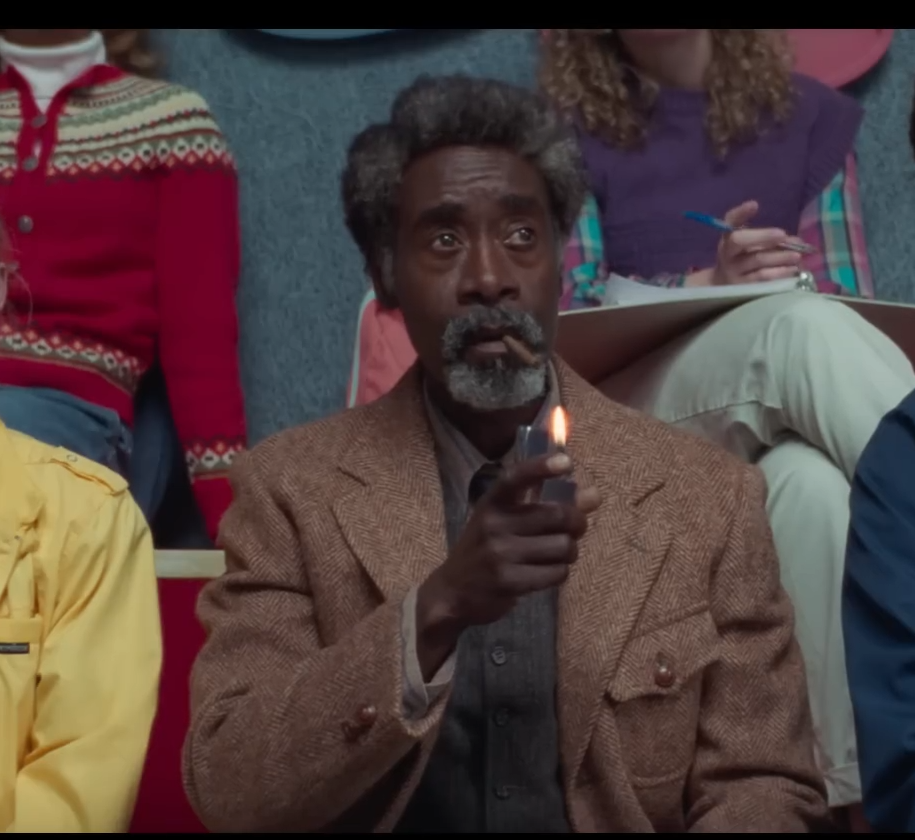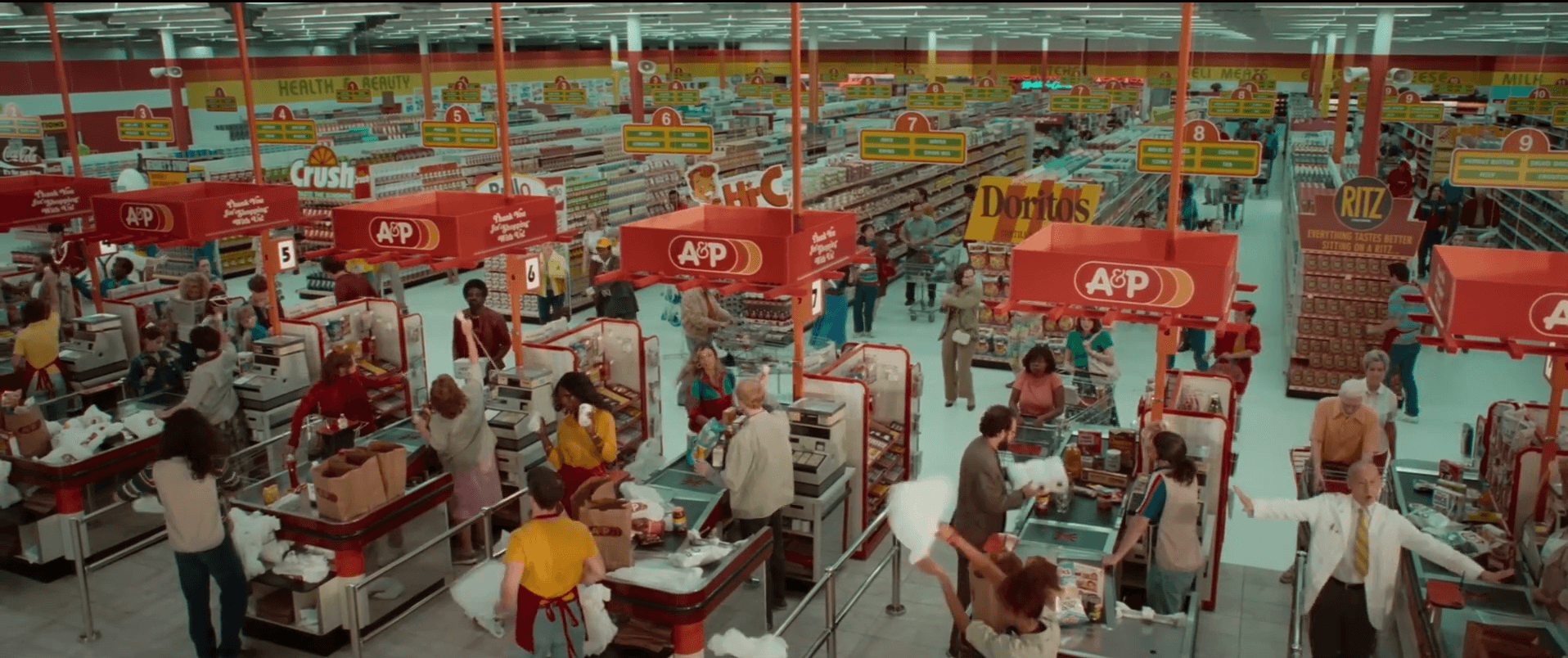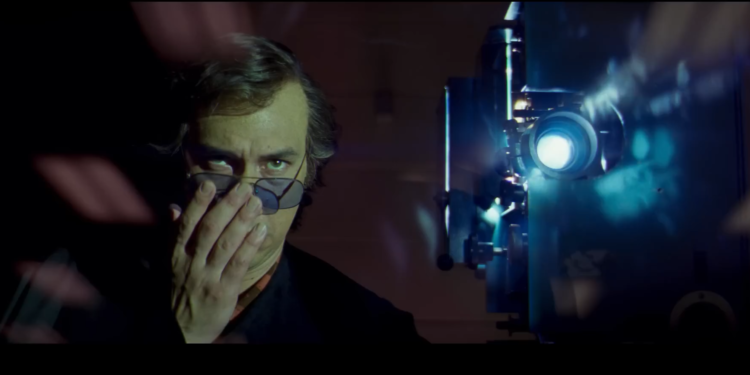“White Noise” is a late-2022 Netflix release film, starring Adam Driver and Greta Gerwig. It is a screen adaptation of a 1985 book of the same name, and is written for the screen and directed by writer-director Noah Baumbach of “Marriage Story” and “Frances Ha” fame.
The film is a profound reflection on society’s dichotomy between necrophilia and abject terror at the idea of death — is what I’m sure Noah Baumbach would like me to say about his January release.
Unfortunately, it falls well short of anything positive I could say about it.
This is a story of the Gladney family, as they flee a toxic gas cloud and their own demons. Over three acts, we watch Jack, Babette and their three children navigate the landscapes of suburban America and of the countours of life, with a narrative repetition that dissolves the idea of absurdist comedy into the cinematic equivalent of a migraine.
If there is a joke to be got, I don’t get it.

We open to scenes of technicolour Americana in the 1980s, treated to the sights and sounds of a university campus coming alive after the humdrumness of the summer break.
Slowly, thereafter, we are treated to our protagonist, Jack, moving through his personal and professional life, sculpting the world we are about to inhabit for over 130 mindnumbing minutes.
He sits in his kitchen, surrounded by the chaos of his four children, embraces his wife, in the form of the bubbly but restrained Greta Gerwig, and goes to work.
He’s a professor at the university, in “Hitler Studies” (That becomes relevant), and the majority of the first act takes place here. His friendship with Don Cheadle’s Murray Suskin character, who is a professor of Modern Icons, acts as a canvas for some of this film’s most ruminative moments. They have two sets of exchanges in a vibrantly colour-coordinated supermarket.
This supermarket is where the whole “reflections on morality” theme manifests, through the acts, which would be fine, if not for Murray Suskin’s relentless narration of the themes his character was clearly made to embody.

He draws reference, in an unbearably sluggish cadence, to the Tibetan concept of “Bardos,” the Buddhist stages of life. He describes the supermarket as a liminal space, much like the Buddhist stages of solution and dissolution that take one from the end of one life to the beginning of the next.
The philosophical melodrama surrounding Suskin’s character as he narrates his way through every layer of the unfurling plot lasagne comes to a head in the first act, as he and Jack engage in a scholarly mating ritual in both the literal and figurative: They paint a vivid picture of left-wing intellectual iconoclasm while pacing and cross-talking their way through a lecture, presenting a parallel and simultaneous lecture on the charisma of Hitler and Elvis.
The visual of Adam Driver in 1980s photochromatic lenses while in pitch-black academic robes is stunning and moving, as he describes the crescendo of noise and favour that underscores the Germans rallying around Hitler.
This wouldn’t be a bugbear, if not for Baumbach’s own contradictory approaches to storytelling: He lays out the same theme to much greater effect in a gas station while the Gladney family flees the toxic cloud.
There’s beautiful, evocative imagery in this scene, the cloud passing over the neon Shell Oil logo, the unsettling crescendo of ambient sound — paper flapping, hinges creaking, and Danny Elfman’s work history with TIm Burton shines through in the gothic horror of orchestral swells that envelop the narrative.
The fascism-critical tone that I’m sure undertones the book is a little on-the-nose throughout the film adaptation: Jack, as a college professor, is obsessed with him, and speaks impassionately about the dictator, especially in his two-man lecture with Suskin.
This, and the consumerism angle would’ve been enough, with bits and pieces of dinner table political debate peppered through. Taking “Show, Don’t Tell” to an extreme, however, Baumbach doesn’t stop.
The most visibly neurotic and clearly somewhat autistic Gladney child is Heinrich. To hazard a guess that this is a thinly-veiled reference to the architect of the Holocaust, Heinrich Himmler is a safe guess.
Furthermore, we see a flyer saying “Case of Goebels,” later on in the film, given that this comes in the middle of government-mandated disaster management, the reference to the German Propaganda ministry that Joseph Goebbels presided over hits home, and not particularly gracefully.
It must be said that Baumbach’s multi-pronged approach to presenting a theme, especially the multiple political themes here, is hit-or-miss, at best.
The music, as mentioned, is beautiful and makes the “absurdist horror” label shine, where applicable. Elsewhere, we find the protagonist Gladney’s family escaping the disaster this film is purportedly about, and the camera comes to rest on two hippies upon the bonnet of a car, singing a typically hippie post-apocalyptic song which has tones of pollution and nuclear disarmament.
To learn that these are real-life married musicians Dean Wareham (Galaxie 500) and Britta Philips does little to revive the thematic dead horse that has been beaten.
Related Articles: Eco-Friendly Moments in Netflix’s Wednesday | The State of CInema in 2022
Unfortunately, as harangued as you’d feel by this point, you’re only halfway through. The disaster and pollution, and community displaced by it, are not how this movie chooses to make its point about a limited lifespan and how inexplicably human it is to fear reaching that limit.
If for some reason you choose to watch this film, I shall save you from the psychopharmacological plot twist that comes somewhere partially through the penultimate third act.
What can and will come out as watching this part has less to do with mortality and making the most of our finite time before the grave, and much more to do with Baumbach’s inevitable return to a broken marriage and the one-dimensional self-actualisation of the woman within that marriage.
The self-absorbed Jack Gladney lectures his wife Babette incessantly as she whimpers and wanes under the stress of deeply internalised mental illness. Maybe this was the point, but it wasn’t well made.
In the second, completely disconnected plotline, the piece of screenwriting that truly gleams, by contrast, is “This is not a story of your disappointment in my silence,” said by an exhausted wife to her deeply unsympathetic husband.
Noah Baumbach is not a sloppy screenwriter nor shoddy at directing a dialogue-led, absurdist piece of fatalistic pathos. Look to “The Meyerowitz Stories (New and Selected).” which is a masterpiece in the kind of bury-the-lead rambling dialogue and crosstalking line delivery that he sought to recreate for this film. It didn’t work.

Screenwriting and direction aside, there are moments of thespian brilliance in this film: Adam Driver is phenomenal, as usual. He commits to a vastly maladjusted character with conviction that is honestly bone-chilling. Don Cheadle shows his chops extend beyond the marvel universe’s Iron Patriot character, his deeply American fascination with the macabre makes more of the point of this film than any other element does.
Jodie Turner-Smith has a molecular role, but her charisma is undeniable and her biochemistry geekery is endearing and flawless.
“White Noise” is not a badly made film: The production value jumps out at you, and not just in monetary expenditure — the costume designers, gaffers, set designers and all others have put genuine talent and vision into making this film look and feel genre — and story — appropriate.
But, and this is a big one, the story that the production centres around isn’t one worth telling, at least not in this way.
Baumbach’s explosion, following the irreverent “Marriage Story,” might have got some less-than-meritorious ideas greenlit by Hollywood producers. I would be remiss to not admit to some misattribution here, in matters of plot devices— Don DeLillo authored the book that this is an adaptation of, a book of the same name.
Having not been a particular consumer of this literature, I wouldn’t know whether this story’s pitfalls are milestone late-century post-modern literature, or Noah Baumbach writing another film to cope with his not-too-recent divorce.
Editor’s Note: The opinions expressed here by the authors are their own, not those of Impakter.com — In the Featured Photo: “White Noise” by Noah Baumbach poster. Featured Photo Credit: Netflix on Youtube–.










